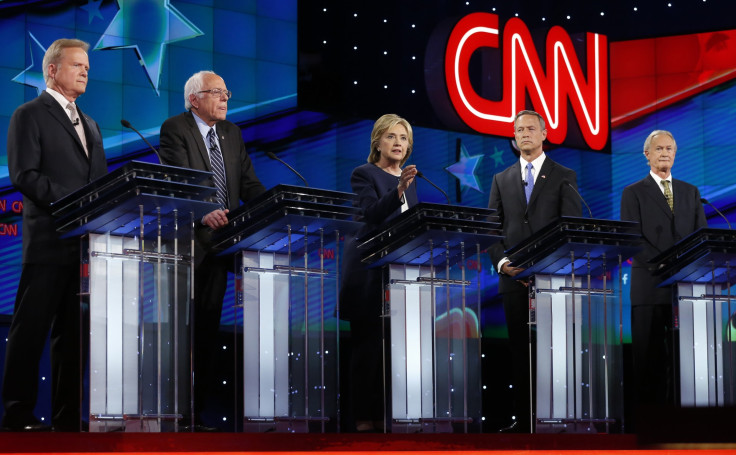Democratic Presidential Debate Marijuana Legalization: Bernie Sanders, Hillary Clinton Call For Shorter Drug Sentences

In the last half hour of the Democratic presidential debate Tuesday night, the conversation turned toward a subject that, according to CNN moderator Anderson Cooper, everybody in the room probably enjoyed: marijuana.
Anderson Cooper says everyone on the debate stage has probably tried marijuana, and probably everyone in the audience. Next #DemDebate topic
— Mike Valerio (@MikeNBC12) October 14, 2015Before the commercial break, Anderson teased he would be asking the candidates about marijuana, but then he directed his question just to former secretary of state Hillary Clinton and Vermont Sen. Bernie Sanders. Sanders said if he could, he would vote to legalize marijuana in the state of Nevada -- which will see the question on its ballot in 2016. Nevada already has legal medical marijuana. Sanders then pivoted to focus on drug arrests, which he said are out of control.
“I suspect I would vote yes,” Sanders said. “I am seeing in this country too many lives being destroyed for nonviolent offenses.” Then he added the United States needs to “rethink this war on drugs.”
While Sanders has said he has smoked marijuana, Clinton has not done so and has no plans to start, Anderson reminded the audience. Clinton said she was not ready to take a position on legalizing marijuana during the debate, but she said she supports medical marijuana and wants more research on the topic. She added she agrees with Sanders that drug-related sentences are too heavy.
The topic of marijuana also came up in Republican debates when former Florida Gov. Jeb Bush admitted he smoked marijuana when he was younger. The Democratic debate in Las Vegas was calmer than both Republican debates so far. Without an obvious Donald Trump-like presence to shake things up, candidates largely stuck to debating policy issues.
Clinton and Sanders have been far ahead of the other candidates in polling and funding for weeks. The latest HuffPost Pollster polling average has Clinton at 45.6 percent nationally and Sanders at 24.4 percent. The others lag behind, with former Maryland Gov. Martin O’Malley and former Virginia Sen. Jim Webb coming in at 1 percent, and former Rhode Island Gov. Lincoln Chafee pulling up the rear with 0.6 percent.
Vice President Joe Biden, who has not yet made up his mind about whether he will run for president, did not participate in the debate Tuesday, although CNN held an extra podium ready for him in case he decided to join at the last minute. His decent poll numbers (19.1 percent nationally) would have let him qualify for the debate according to CNN’s rules, which stipulated that candidates must reach an average of at least 1 percent in three recent polls recognized by CNN. In recent weeks, supporters have urged the vice president to make a call, but the New York Times reported Monday his aides are researching filing deadlines to see if he can hold out into November.
The other candidate who did not debate Tuesday is Lawrence Lessig, the Harvard professor who is running as a single-issue candidate with the goal of reforming campaign finance laws. Lessig, who has not been included as an option on many recent polls, did not meet the polling criteria to participate.
© Copyright IBTimes 2025. All rights reserved.






















